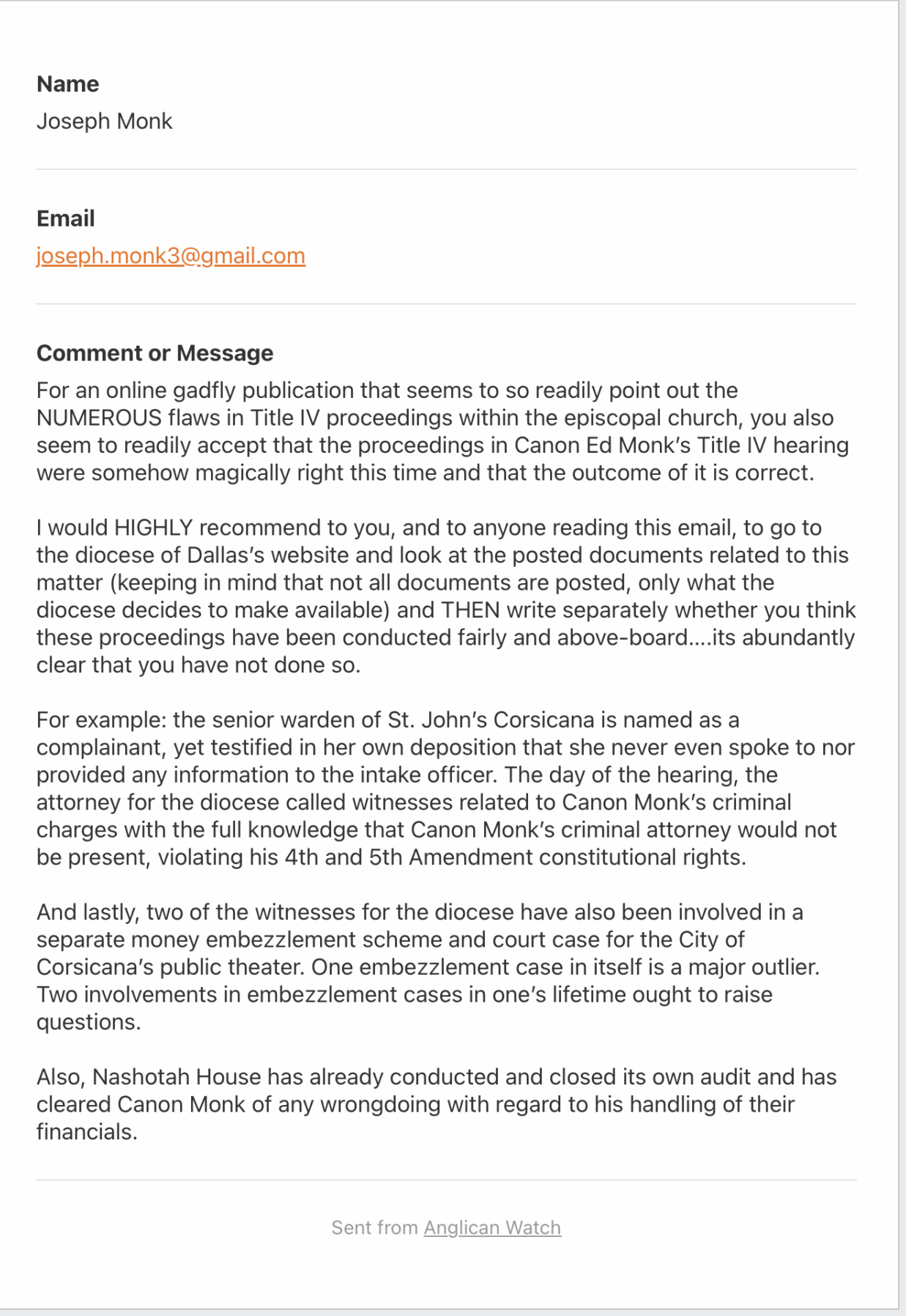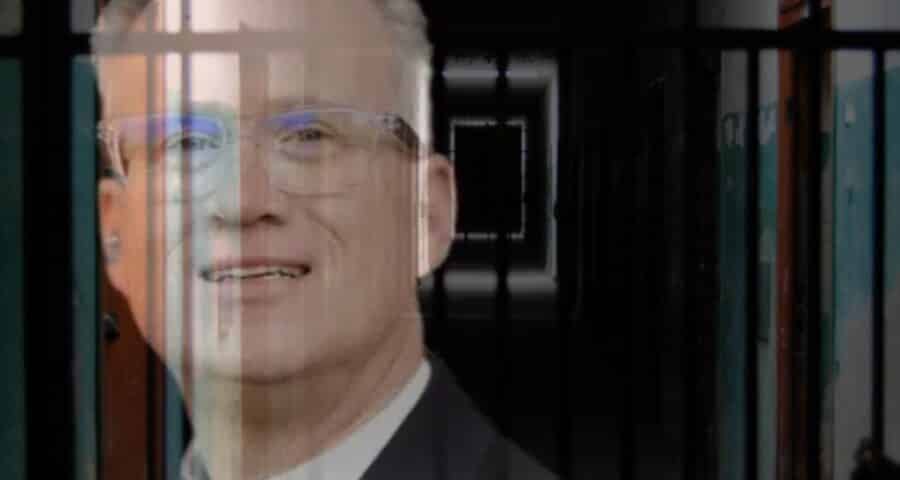The old saying that it’s better to remain silent and be thought a fool than to open one’s mouth and remove all doubt is true.
And so it is with an email from Joseph Monk, a relative of Corsicana Texas priest Ed Monk, who attempts to take us to task over our coverage of the Title IV and criminal allegations involving Ed Monk, which involve allegations of large-scale embezzlement from his parish over a ten-year period.
The text of Joseph’s email is below:

So, let’s parse the issues raised in Monk’s email, roughly in the order he brings them up.
1. Yes, we are a gadfly publication and damned proud of it. Thanks for noticing.
2. More than one thing can be true. Title IV, particularly at the national level (and in any situation involving George Sumner, who is a lousy and corrupt bishop), is a hot mess. At the same time, it looks like, for once, the Diocese of Dallas got it right when it lowered the boom on Monk.
3. We’ve read all of the public documents in the Monk case, and many that are not public. We have no qualms at all about our conclusion that Monk is guilty and believe he will be found guilty in a criminal court of law. We’ve also done extensive investigation of our own, including running background checks on many of the key players in this sordid mess. (One individual, by the way, appears to have a felony criminal conviction in Texas for child indecency, as well as a so-called Chapter 20 bankruptcy, which is a Chapter 7 discharge accompanied by a Chapter 13 cramdown on the terms and conditions of debt.)
4. As to the senior warden being a complainant, Mr. Monk would do well to actually read Title IV. Canon IV.2 provides:
Complainant shall mean (a) the person or persons from whom the Intake Officer receives information concerning an Offense or(b) any Injured Person designated by the Bishop Diocesan who, in the Bishop Diocesan’s discretion, should be afforded the status of a Complainant, provided, however, that any Injured Person so designated may decline such designation.
Conspicuously absent is any requirement that a complainant designated by the bishop speak to an intake officer. Rather, the designation of someone as a complainant affords them specific rights under Title IV. As such, when in doubt, it is best to designate all primary victims as complainants, absent any objection from the victims.
5. As to Fourth and Fifth Amendment rights, it is axiomatic that those apply only to judicial proceedings. They are irrelevant in an ecclesiastical proceeding such as Title IV.
Further, for the record, there is no privilege against self-incrimination in a Title IV proceeding. Indeed, “I plead the Fifth” is, itself, an ecclesiastical offense under Title IV.
Plus, there’s the logical issue: If indeed Ed Monk is innocent, he should be eager to share his perspective, versus caterwauling about how his ecclesiastical testimony might cause problems during his criminal proceedings. Nor does Monk have any Fourth or Fifth Amendment rights to have an attorney present during an ecclesiastical hearing — not to mention that, since hearing panel proceedings are open to the public, if Monk didn’t have defense counsel present, he not only waived any legal objection, but he did so of his own volition.
And, to be clear: What likely sends Monk to jail will not be his Title IV testimony, but instead the forensic audit of church finances, which allegedly indicates that his embezzlement goes back more than ten years. Moreover, the trial court may view his alleged efforts to prevent sharing financial reporting with the church treasurer as an effort to conceal the crime, which likely will be considered an aggravating circumstance for purposes of sentencing. And we will be very interested to see what a forensic audit of Monk family finances reveals as, in our experience, it is rare for a spouse to have no inkling of the underlying malfeasance.
6. Relatedly, we note that clergy, by virtue of their vows taken at ordination, are rightly held to a higher standard than the public at large. Thus, Joseph Monk’s objections to the Title IV proceedings are disingenuous.
7. As to the purported criminal history of two of the diocese’s Title IV witnesses, again, this is a red herring. Indeed, much of the evidence brought forth in the Title IV case appears to come from two sources: 1) the underlying criminal investigation and 2) the forensic audit.
That said, we would, of course, welcome an explanation as to how Ed Monk purportedly opened credit cards using confidential data of a elderly parishioner. Let us guess: It was all a bank error, and he NEVER REALIZED he was the holder of someone else’s credit card.
Moreover, the allegations that Monk solicited a donation from a parishioner to “clear the matter up” are a per se violation of Title IV. Specifically, the only circumstance in which a clergy person may accept a loan or personal gift of this nature is when the loan is approved by the vestry, and typically only for the down-payment on a personal residence. So, if that indeed happened, Monk already is in deep trouble.
8. The notion that two of the Diocese’s witnesses have criminal histories is irrelevant. Many criminal convictions have been secured after an accomplice, already in custody, talked too much. And two alleged criminals doesn’t serve as justification for a priest to allegedly be a third criminal.
9. As for Nashotah House and its purported audit, all we can say is we have seen far too many cases where a priest says, “Our audit is clean,” but an audit wasn’t even performed. And even if Nashotah House did a forensic audit and it’s clean, so what? There are still the various Corsicana charities and the local school district that have ample reason to be concerned about the allegations against Monk.
10. Joseph Monk’s missive underscores a key challenge in this matter: Neither Ed nor his family evince any sign of remorse, and at this point, it’s going to be very difficult to convince a judge or jury to the contrary.
11. We reiterate an important issue: If, in fact, Monk embezzled from his parish for more than a decade, he is beneath contempt. So don’t roll through this corner of cyberspace looking for sympathy. And denying everything is not the same as repentance, so don’t try that line on us, either.
11. Joseph Monk’s ill-advised commentary makes it all the more likely that the Church Pension Group (CPG) and/or the parish will sue Monk to recover funds not reimbursed by insurance. Not only will this post, including his email, wind up coming into evidence, but the entire family, including Ed’s wife, face the prospect of being deposed under oath. We can all but guarantee that will not go well. And, in many jurisdictions, if there is a single penny of commingled funds, Monk’s wife’s assets are up for grabs as well.
Further, we are mindful that, in the case of large embezzlements as is alleged here, CPG coverage often is woefully lacking. Indeed, there’s always some knucklehead who says, “It can’t happen here. We all know each other!”
So, no one should be surprised if a civil suit becomes part of the mix.
We also note something painfully obvious: Nowhere does Joseph say that Ed is innocent. That said, if he believes that to be the case and has evidence to support that conclusion, we’re all ears.
In the meantime, a word to the wise: Keep your mouth shut unless you’ve spoken with criminal AND civil defense counsel first.
To do otherwise accomplishes just one thing, which is to make a bad situation worse.


PS The only reason this matter reached a hearing panel is that Monk refused efforts to resolve the matter at a lower level. Possibilities included a negotiated accord with the bishop, resolution at the conference panel level, mediation and accord, and more.
And now this dunderhead complains that he didn’t like the hearing panel process?
Spare us.
We also remind readers that, under Texas law, embezzlement of more than $200,000 is a first-degree felony, with prison terms from 5 to 99 years. Aggravating circumstances include when the victim is a non-profit, or when the victim is elderly. Both are alleged here.
Our fingers are crossed for the full 99 years for Monk, as well as asset forfeiture and conspiracy charges for anyone who aided and abetted his efforts.
And no, accountability is NOT inconsistent with Christianity, and even less so when, as here, there is ZERO sign of repentance.
So, ladies and gentlemen of the jury, when you hear Monk testify that the church violated his rights by conducting a Title IV proceeding, consider that he had numerous opportunities to resolve the matter without going to a public hearing panel. This, we submit, makes clear that Monk is in no way remorseful for his actions, and deserves the fullest penalty available under the law, including the maximum possible prison term.